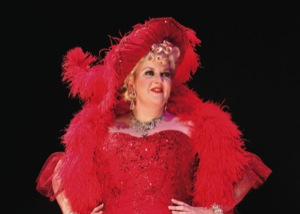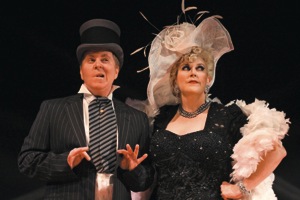
Try this. Repeat the following sentences after me: “It’s not the men in your life that matter; it’s the life in your men.” Or, “I use to be Snow White, but I drifted.” Or, “Marriage is a fine institution, but I’m not ready for an institution.”
Can anyone utter these truisms spoken by the immortal Mae West without growling a little, pumping up a shoulder like you are lifting an ostrich feather boa into place and coming off like a gruff dog barking slowly?
It’s pretty amazing that a woman who didn’t make her silver screen debut until she was thirty-eight has been so immortalized in popular culture and in the lexicon of English quotations. Thanks to dozens of controversial but delicious double entendres, most rooted in her own sexually robust reality Mae West has proven to be an icon with staying power.
Mae West can also be credited for saying, “If a little is great, and a lot is better, then way too much is just about right!” And that sounds about right as far as Dirty Blonde is concerned; now playing at the Cygnet Theatre through June 17. There are tons of original zingers, which the play needs and relies upon heavily; there is a clunky plot contrivance and way too much camping around by men in heels. Wait; can there ever be too much of that?
In other words Dirty Blonde like Mae West is a little bit over the top, kind of strange but in the end pretty entertaining. If spit sprayed from my mouth more than once because I am jolted into laughter then the play warrants some kind of thumbs up. And how could I not be jolted into some kind of reaction when a character proclaims that she is going to sip coffee from a cup stashed in her handbag like she is “performing cunnilingus to her Prada?”
I laughed a lot and you will too, but almost always at the amazing original quotes rather than anything particularly riotous about the play. Written by Claudia Shear and directed by Artistic Director Sean Murray Dirty Blonde is an homage to the vaudeville and movie star Mae West told in sequential bio-pic fashion. Yet West’s determination to become a star is interwoven into the life and longings of a contemporary couple, Charlie and Jo. This is where things get strange and a little bit complicated both on stage and in the script. Charlie (Steve Gunderson who also plays plenty of “others”) and Jo (Melinda Gilb who is also Mae West) are fans of Ms. West for similar and at least one profoundly different reason. Through their relationship, we learn and witness the rise and sad plateau of an early movie star bound and determined to be a star.

I can see how the contemporary device is useful but it took me quite a few minutes to get myself oriented to the chopped up circumstances, maybe because the production’s three performers rely entirely upon a bare stage and projected titles. First on stage are Charlie and Jo, but this might have been a very early Mae West (despite the denim jacket); I couldn’t be sure, and I was thinking about it too hard. Then we are clearly in early Mae West territory and the audience is being invited to perform a role as her actual audience, being encouraged to clap on cue by an anxious looking Steve Gunderson in one of his early incarnations as an early and disposable collaborator on the vaudeville circuit.
The back and forth structure finally settles in and the roughly hour and forty minute show (without intermission) unfolds with many laughs and quite a bit of education as far as Mae West’s trajectory drive and financial savvy is concerned. Both West and the play are ably aided throughout by the rubber-faced and ubiquitous David McBean who morphs as needed from Catholic schoolgirl to James Cagney gangster, to raving homosexual.
Melinda Gilb is fine as both Mae West and Jo. She fits West’s gowns nicely and delivers young Mae West lines with the aforementioned and necessary gruff dog growl. She delivers old Mae West’s lines the same way, which is the point. Gilb also transforms into Jo, a sad girl wanting to be a tough girl before realizing she’s an ordinary girl quickly and mercurially. Gunderson does just as good a job with his various roles. One minute he is nebbish young Charlie, a starry eyed fan, then he is older Charlie, a shy and peculiar man, plus a whole slew of characters that test his range. It looks like he is having a lot of fun with it.
Everyone does a great job, but somehow I am tripped up by Charlie’s story and his relationship with Jo. There is something gratuitous about it. I don’t quit get the point. There is also something a little deflating about a couple of ordinary people with larger than life dreams who ultimately settle for not much and one another. There’s is a happy ever after, but it’s a weird, unfinished one that seems to have little to do with Mae West’s life.
Dirty Blonde is chock full of homosexual “types” from way back when which made me laugh and wince equally, my wincing oddly amplified when I scanned the dour faces of the silver-haired husbands in the audience who did not look amused at all. But the play is funny spotlighting a woman who was who she was well before her time. At the same time Dirty Blonde does its requite bit to re-affirm that very American phenomenon of being true to who you are and making it big despite the odds, come what may, before paying a price for that success at the end of the day.
Or, to quote Mae West one more time: “I wrote the story myself. It’s about a girl who lost her reputation and never missed it.”
Cygnet Theatre, through June 17.










